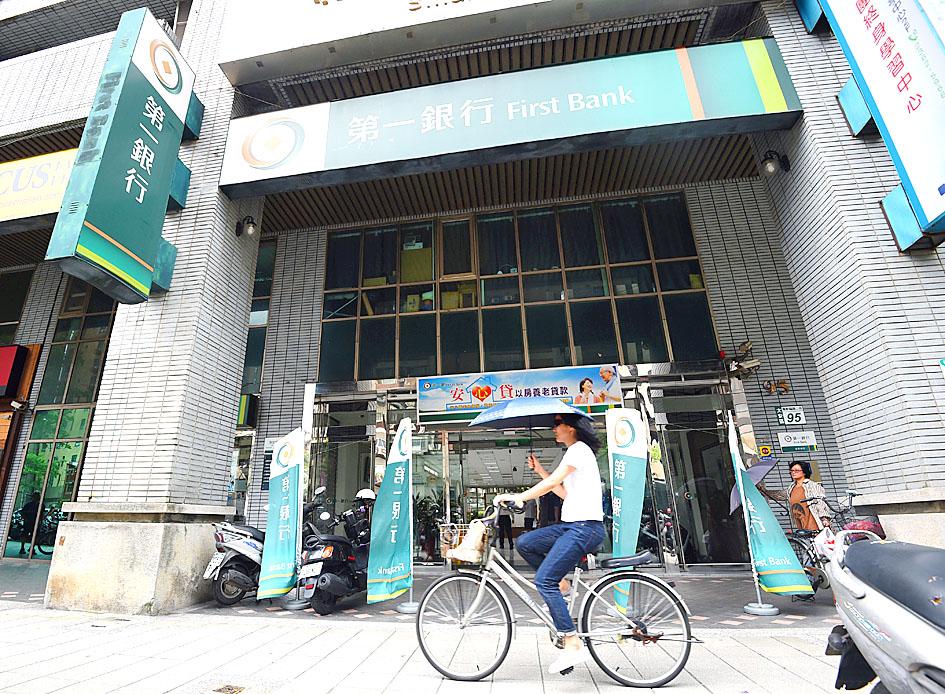State-run First Commercial Bank (第一銀行) forecast that its loan growth would reach 7 to 8 percent this year, following an 8 percent increase to NT$1.91 trillion (US$67.5 billion) last year, bank vice president Tsai Su-hwei (蔡淑慧) said.
Benefiting from a low interest rate environment, corporate loan growth at the banking arm of First Financial Holding Co (第一金控) is forecast to reach 8 to 9 percent this year, along with 4 to 5 percent growth in mortgage loans, Tsai said at an online earnings conference on Thursday.
In addition, the company’s net fee income is predicted to grow 15 percent this year on the back of steady growth in the economy, compared with a decline of 6.8 percent to NT$7.33 billion last year, she said.

Photo: Peter Lo, Taipei Times
The bank’s net interest margin is likely to fall to 0.95 percent in the first half of this year, from 1 percent at the end of last year, due to less interest income from bonds, it said.
First Bank’s net profit fell 17.6 percent year-on-year to NT$15.68 billion last year, as the net interest margin was affected by central banks’ expansionary monetary policies and its investment gains fell amid the COVID-19 pandemic.
The bank, established in 1899, has 194 branches in Taiwan, 16 branches abroad and a subsidiary in the US. Its lackluster performance was in stark contrast with its securities and insurance affiliates, which benefited from the booming equity market in Taiwan.
First Securities Inc’s (第一金證券) net profit reached NT$744 million, up 173.5 percent year-on-year, while its insurance affiliate First Life Insurance Co’s (第一金人壽) net profit was NT$485 million, up 98.8 percent, First Financial data showed.
Overall, First Financial’s net profit fell 13.2 percent to NT$16.81 billion last year from a year earlier, which translated into earnings per share of NT$1.31. The company’s net value per share was NT$17.23 last year and its return on equity was 7.6 percent.
First Financial said its asset quality continued to improve as First Bank’s nonperforming loan ratio fell to 0.24 at the end of last year, from 0.29 percent in the first half of last year, and the bank’s loan-loss coverage ratio stood at 527 percent, up from 404 percent at the end of June.
The financial holding’s capital adequacy ratio (CAR) was 125.25 percent at the end of last year, up from 123.18 percent at the end of June, while its banking unit’s CAR was 13.63 percent and tier-1 CAR was 11.66 percent, compared with 43.43 percent and 11.44 percent six months earlier respectively, company data showed.
The company said its dividend payout ratio would remain at about 60 percent this year.
Jih Sun Securities Investment Consulting Co (日盛投顧) said in a note on Friday that First Financial’s outlook for this year appears positive, as its banking unit’s loans are forecast to grow in high single-digit percentages and its net interest margin is expected to remain stable, while credit cost is predicted to decrease from last year due to less corporate risks.

NO BREAKTHROUGH? More substantial ‘deliverables,’ such as tariff reductions, would likely be saved for a meeting between Trump and Xi later this year, a trade expert said China launched two probes targeting the US semiconductor sector on Saturday ahead of talks between the two nations in Spain this week on trade, national security and the ownership of social media platform TikTok. China’s Ministry of Commerce announced an anti-dumping investigation into certain analog integrated circuits (ICs) imported from the US. The investigation is to target some commodity interface ICs and gate driver ICs, which are commonly made by US companies such as Texas Instruments Inc and ON Semiconductor Corp. The ministry also announced an anti-discrimination probe into US measures against China’s chip sector. US measures such as export curbs and tariffs

The US on Friday penalized two Chinese firms that acquired US chipmaking equipment for China’s top chipmaker, Semiconductor Manufacturing International Corp (SMIC, 中芯國際), including them among 32 entities that were added to the US Department of Commerce’s restricted trade list, a US government posting showed. Twenty-three of the 32 are in China. GMC Semiconductor Technology (Wuxi) Co (吉姆西半導體科技) and Jicun Semiconductor Technology (Shanghai) Co (吉存半導體科技) were placed on the list, formally known as the Entity List, for acquiring equipment for SMIC Northern Integrated Circuit Manufacturing (Beijing) Corp (中芯北方積體電路) and Semiconductor Manufacturing International (Beijing) Corp (中芯北京), the US Federal Register posting said. The

India’s ban of online money-based games could drive addicts to unregulated apps and offshore platforms that pose new financial and social risks, fantasy-sports gaming experts say. Indian Prime Minister Narendra Modi’s government banned real-money online games late last month, citing financial losses and addiction, leading to a shutdown of many apps offering paid fantasy cricket, rummy and poker games. “Many will move to offshore platforms, because of the addictive nature — they will find alternate means to get that dopamine hit,” said Viren Hemrajani, a Mumbai-based fantasy cricket analyst. “It [also] leads to fraud and scams, because everything is now

MORTGAGE WORRIES: About 34% of respondents to a survey said they would approach multiple lenders to pay for a home, while 29.2% said they would ask family for help New housing projects in Taiwan’s six special municipalities, as well as Hsinchu city and county, are projected to total NT$710.65 billion (US$23.61 billion) in the upcoming fall sales season, a record 30 percent decrease from a year earlier, as tighter mortgage rules prompt developers to pull back, property listing platform 591.com (591新建案) said yesterday. The number of projects has also fallen to 312, a more than 20 percent decrease year-on-year, underscoring weakening sentiment and momentum amid lingering policy and financing headwinds. New Taipei City and Taoyuan bucked the downturn in project value, while Taipei, Hsinchu city and county, Taichung, Tainan and Kaohsiung